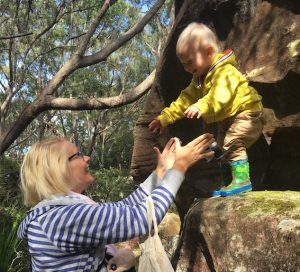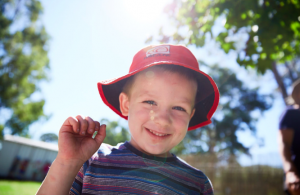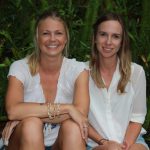Recently we have seen the development of many bush kinders, nature playgroups and adventure playgrounds and a shift to ‘seeing’ nature as a playground for children (Fjortoft, 2001). This reflects the mounting body of evidence that the natural environment is beneficial to children’s health and wellbeing. Francis (1988) argued that children’s play in an unstructured environment, preferably a natural one, gives children the genuine understanding of reality.
This notion for unstructured physical play is timely for us as a society. We are living in a day and age where many children learn how to climb a tree via a digital media device rather than physically experiencing what it feels, smells and tastes like to climb a tree, and to build that genuine emotional connection that only comes from climbing a real tree.
As early childhood teachers we are noticing more and more children needing to be guided in their play and we wonder if this is because we adults over-structure children’s lives in an attempt to get them ahead and ready for university at age 5? Or is it because we as a society create ‘play’ experiences for children to be ‘involved’ in such as soccer and netball rather than allowing children to be the agents of their own play?

Equip parents with trust
Parents all want the best for their child/ren and every family’s visions, expectations and ideals are as unique as they are. As educators it’s important to work together with families and give them the skills and knowledge to facilitate, step back and trust their child’s capabilities. In turn, we need to value the importance of giving children time to experience real opportunities to test boundaries, experience natural consequences, push through challenges and negotiate risk.
And yes: you guessed it! All these fabulous things can and do occur naturally in children’s play when they are afforded with the right balance of a few key ingredients – time, trust, space and relationships. No toys, no iPad, no desks, no worksheets, flashcards, whistles or pressure in sight. Just child-led play.
At the beginning of term we notice many children really exploring the boundary and perimeter of the reserve space for our play programs. This can initially make some parents feel unnerved. A big part of our role as facilitators is to support these families to build their confidence, skills and practice as well as the children.
We reassure parents that, if they follow their child’s lead, it will allow their child to map the terrain and boundaries to gain an understanding of the space. This will lead them to come back in closer as they feel connected and safe with their new and valuable knowledge of the surroundings. It is a very important part of the children learning to self-regulate and create their own sense of structure in a space that is largely unstructured. The early exploration will also provide valuable intel as their imaginations are fully unearthed and they remember that super awesome tree with the wonky branches, perfect for the hat stand in their play shop!
Trust comes with time
Our deep, underpinning philosophy is to provide children with an unhurried environment and create time to enable the family members to slow down, connect and experience the magic of the world through the eyes of their child. Watching a mother and her son walking together through the bush, finding a rock to stop and sit down on to discuss the things that they notice, is nothing short of magical. Not only are they becoming attuned to the music of the bush; sounds, colours, textures, smells, flora and fauna. They are becoming deeply connected to each other.
 One family writes:
One family writes:
“As a mother Raw&Unearthed has been a deeply satisfying and connecting experience every week. To explore nature in its raw form through the eyes of my young son has made me re-discover the beauty of the simple, little adventures that nature provides! To spend time in the outdoors completely unrushed, following my son’s lead and observing his discoveries has allowed me to be really present with him during the sessions which has been so special. Every week I am excited to see the creativity and true enthusiasm that Bec and Sarah show in the materials and inspiration they provide and am grateful for the guidance and knowledge they share on nature play.”
Outside, strong and trusting relationships are valued and create the foundations for everything you do. It is through these strong reciprocal relationships that we gently guide children and families to negotiate risk and build trust in themselves and in their children. Through these relationships of trust and support a child’s natural urges and curiosities will kick in and their imagination will take the lead.
Watch the transformations
We have observed an infant who would join his older brother at the sessions. He spent a lot of time just sitting at the bottom of honeymoon rock – the most fabulous climbing rock you’ve ever seen. Touching it with his hands, pulling himself up to stand and laying on it on his tummy all the while studying the movements of the older children scaling, crawling, climbing and sliding off. Sure enough he is now walking and his mission is to conquer the rock. He uses the lizard climbing technique to move his body up parts of the rock surface but other sections of the rock are still too steep and he remains frozen in position.
Watching this unfold overtime has been truly wonderful to see. His mum does wholeheartedly value the journey that he is on by simply choosing not to put him up on top of the rock herself: this gives him the opportunity to risk assess, problem solve, activate his vestibular sense, negotiate his movements, build strength and most importantly experience a healthy dose of struggle to develop a delayed sense of gratification. Not everything in life happens instantaneously by swiping right!

One child in the group who would frequently arrive wearing gloves and would only remove them to eat his morning tea. Although we would have loved for him to be getting the sensory input from touching the rocks, dirt, grass and sticks with his bare hands, we accepted that in order for him to be comfortable within the outdoor environment he needed to have his gloves on. Slowly over the term we would notice him playing, gloves removed. By the end of his first term he was ready. In his own time he had made the decision to dive hands first into the mud. He was rubbing his hands together and spreading it up and down his arms. We noticed him smiling secretly to himself. This was a real challenge that he had worked through independently without pressure and in his own time.
Nature is simply remarkable! It accepts people at their own unique level of comfort and connection. There is no pressure to be a certain way or to conform to society’s (limited) ways of being. Nature allows you time and space to just be you.
We selected Kincumba Mountain reserve to be our home space as the open grassy fields, big bolder rocks, dense bush, man-made trail walks, caves, wildlife, scrubby bushland spaces and boggy marsh areas just beg to be explored. The air is fresh, the grass often dewy and adventures are waiting to be had.
The children and their families now call this space their own special name. Ever excited all week long asking, ‘Is today the bush party mum?’ or ‘Are we going to mud mountain today?’ Our favourite is when they wake up with eyes filled with excitement because today is the day they are going to ‘Bec and Sarah’s house’.
References:
Fjortoft, I. (2001). The Natural Environment as a Playground for Children: The Impact of Outdoor Play Activities in Pre-Primary School Children. Early Childhood Education Journal 29(2), 111-117
Francis, M. (1988). Negotiation between children and adult design values in open space projects. Design Studies, 9(2), 67-75
Meet the authors

Bec Carey and Sarah Hammersley are early childhood teachers on endless adventures in nature. With 23 years’ ECEC experience between them they have created a program that takes children outside the gates and into the magical spaces of Kincumba Mountain Reserve on the NSW Central Coast.